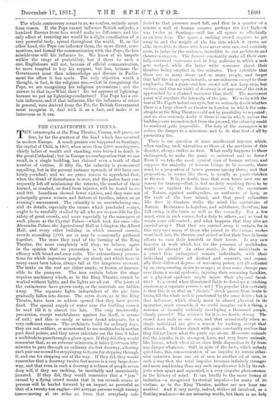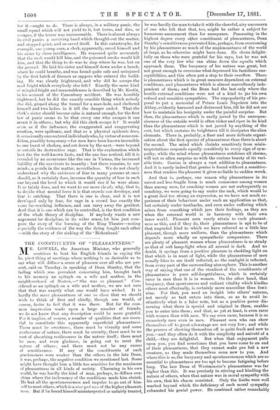THE CATASTROPHE IN VIENNA.
THE catastrophe at the Ring Theatre, Vienna, will prove, we fear, by far the greatest of the kind which has occurred in modern Europe. A much greater one happened in Santiago, the capital of Chili, in 1863, when more than 2,000 worshippers, chiefly ladies of wealth and standing, were burned to death in the great Cathedral ; but in Europe no conflagration that we can recall, in a single building, has claimed even a tenth of that number of victims, If fifty die, the calamity is pronounced appalling, but in the present instance upwards of 600 have cer- tainly perished ; and we see grave reason to apprehend that, when the dread of disturbance is over, and the police have con- sequently left off minimising the returns, the number of those _ burned, or crushed, or dead from injuries, will be found to ex- ceed 900. Isandlana showed fewer victims, and they were not principally grown women and fathers of families, intent on an evening's amusement. The calamity is an overwhelming one, and its details, especially the causes which precluded escape, ought to be carefully studied by all who are responsible for the safety of great crowds, and more especially by the managers of such places as the Crystal Palace—which took fire once—the Alexandra Palace, the Agricultural Hall at Islington, the Albert Hall, and every other building in which unusual crowds, crowds exceeding 5,000, are or may be occasionally gathered together. The more they read of the burning of the Ring Theatre, the more completely will they, we believe, agree in the opinion that no precaution is to be compared in efficacy with broad and easy exits. The extraordinary precau- tions for which ingenious people cry aloud, and which have in many cases been taken, always fail at the dangerous moment. The tanks on the roof are either empty, or frozen, or inacces- sible to the pumpers. The iron curtain before the stage requires machinery which, as in the Ring Theatre, cannot be worked without lights, and the lights are all out. The joints of the extincteurs have grown rusty, or the materials are hidden away. The separate lights independent of the gas have gradually fallen into disuse. The extra doors, as in the Ring Theatre, have been so seldom opened that they have grown fixed. The special supply of water near the building cannot be used till it is almost too late. The only trustworthy precaution, except watchfulness against fire itself, is means of exit.; and this is rarely or never found adequate, for a very sufficient reason. The architects build for ordinary days, they are not soldiers, or accustomed to see multitudes in motion past fixed points, and they never calculate out the time it takes a multitude to pass through a given space. If they did, they would remember that, as an extreme minimum,it takes 2,000 men fifty minutes to pass through an ordinary six-feet doorway, allowing each pair one second for stepping up to it, one for stepping through it, and one for stepping out of the way. If they did, they would remember that a doorway twelve feet across is a very large door- way, and that even in such a doorway a column of people seven deep will, if they are rushing, be inevitably and inextricably jammed. If they did, they would remember that a " jam " caused by a flying crowd means that in ten seconds scores of persons will be hurled forward by an impact as powerful as that of a twenty-ton engine-400 average persons weigh twenty tons—moving at six miles an hour, that everybody sub- jected to that pressure must fall, and that in a quarter of a minute a wall of human corpses perhaps ten feet high—it was twelve at Santiago—will bar all egress as effectually as an iron door. The space a rushing crowd requires to get away in and the weight of the fan into which it opens are alike incredible to those who have never seen one, and certainly seem, to judge by the evidence, incredible to our architects and theatre-managers. The former constantly make all their care- fully-contrived staircases end in long galleries in which a mob gets wedged, while the latter write nonsense about their theatres being emptied in five minutes. They calculate that there are so many doors and so many people, and forget that half the doors open inwards, or are unknown except to their employes ; that a panic-stricken crowd will not keep step, but rushes ; and that no width of doorway is of any use, if the exit is approached by a channel narrower than itself. The narrowest point will regulate the intensity of the jam. We write with the fear of Mr. Pigott before our eyes, but we seriously doubt whether there is a large church or theatre in London in which the cata- strophe at the Ring Theatre could not by possibility be repeated ; and we also seriously doubt if there is one in which, unless the building were reconstructed from the ground, the calamity could be rendered quite impossible. The duty of the managers is to reduce the danger to a minimum, and to do that first of all by preventing fire.
There is one question of sonic intellectual interest which, when reading such narratives as those of the survivors of this disaster, always strikes us first. What really happens to those endangered, to make the panic so universal and so fierce ? Even if we take the most cynical view of human nature, and suppose the majority of human beings to be cowards, there must be a proportion of brave persons among them; and that proportion, in scenes like these, is usually as panic-stricken as the rest. It is, no doubt, true that even brave men see no reason for bravery—that is, feel no duty requiring them to be brave—as against the dangers caused by the operations of Nature, against earthquakes, or outbursts of lava, or the rush of the bore inland, and that great calamities like fires in theatres strike the mind like operations of Nature. Resistance is hopeless, and selfishness, therefore, has full swing, in the brave as well as the cowardly. But a few must, even in such scenes, feel a duty to others, and so tend to retain some self-control ; and what happens that they also are carried away ? That they are carried away is certain, for in this very case many of those who joined in the furious rushes went back into the theatre, and risked or lost their lives in heroic efforts to save their kinsfolk or their lovers. Is any new impulse at work which, but for the presence of multitudes, would be absent ? In other words, do the individuals in a crowd thus endangered remain individuals, with their individual qualities all distinct and separate, and especi- ally their different degrees of reasoning power, yet all actuated by an overpowering desire to escape; or does some change pass over them, a moral epidemic, injuring their reasoning faculties, as a physical epidemic might injure their physical facul- ties? Is a crowd when threatened liable to develope a catching emotion as a separate person is not ? The popular idea certainly is that this is so, that an " electric " shock passes from brain to brain, till the whole mob is penetrated by the same desire ; but is that influence, which clearly must be almost physical in its operation, must resemble, if we could imagine such a thing, a maisma of insanity suddenly enveloping a thousand people, clearly proved ? The evidence for it is, no doubt, strong. The crowd does rush as one man, and that occasionally when no single individual can give a reason for rushing, except that others rush. Soldiers struck with panic constantly confess that they did not know what the panic was about. Moreover, animals feel the impulse in its strongest form, and very brave animals, like bisons, which when alone show little disposition to fly from any danger whatever. Still, in spite of the facts, which nobody questions, this communication of an impulse by means other- wise unknown from one set of men to another set of men, in such a way that the total impulse becomes infinitely stronger and more maddening than any such impulse ever felt by its sub- jects when apart and separated, is a very singular phenomenon in the history of mind. It can hardly be the mere frenzy of imitation—a recognised hysterical impulse—for many of its victims, as in the Ring Theatre, neither see nor hear one another. And it very rarely, indeed, strikes all involved, as a floating madness—we are misusing words, but there is no help
for it—ought to do. There is always, in a military panic, the small squad which will not yield to it, but turns, and dies, or e 4capes, if the terror was unreasonable. There is almost always in civil panics a surviving band which thought-out the matter, and stopped quiet, and so saved itself. In this catastrophe, for example, one young man, a clerk, apparently, saved himself and his sister by sheer intelligence. He reasoned quite accurately that the rush would kill him, and the poisoned smoke would kill him, and that the thing to do was to stop where he was, but on the ground. He laid his sister and himself down under a bench, where he could breathe, and was found quite safe and uninjured by the first batch of firemen or sappers who entered the build- ing. He was clearly frightened, and why did he escape the mad fright which everybody else felt ? Exactly the same kind of mingled fright and reasonableness is described by Mr. Kestin, in his account of the Canonbury accident. He was horribly frightened, but he did the exactly sensible thing which nobody else did, groped along the tunnel for a man-hole, and sheltered himself and two ladies in it till the danger ended. That the clerk's sister should become calm is natural enough, for the first law of panic seems to be that every one who escapes it can arrest it in others ; but why did this clerk escape it ? It would seam as if the influence, the exaggerated and exaggerating emotion, were epidemic, and that as a physical epidemic does, it occasionally encountered individuals who, by virtue of some con- dition, possibly temporary—for men have been known insensible to one burst of cholera, and cut down by the next—were beyond or outside its destructive rage. That is the explanation which best fits the well-known facts, and the one less noticed, till it is revealed by an occurrence like the one in Vienna, the increased liability of the survivors to insanity ; but there remains, to our minds, a puzzle in the matter, nevertheless. We do not clearly understand why the existence of fear in many persons at once should, as it certainly does, increase the quantity of fear in each one beyond the level to which it would rise if he were alone. It ce tainly does, and we want to see more clearly why, that is, to decide what mental force it is that crowds can develope, and that ii catching. That there is one is clear, and it is not developed only by fear,' for rage in a crowd has exactly the same far-reaching influence, and can carry away the gentlest. And that it is one which can be controlled, is the first condition of the whole theory of discipline. If anybody wants a new argument for discipline, in its wider sense, let him just com- pare the story of the burning of the Ring Theatre—noting especially the evidence of the way the dying fought each other —with the story of the sinking of the ' Birkenhead.'











































 Previous page
Previous page